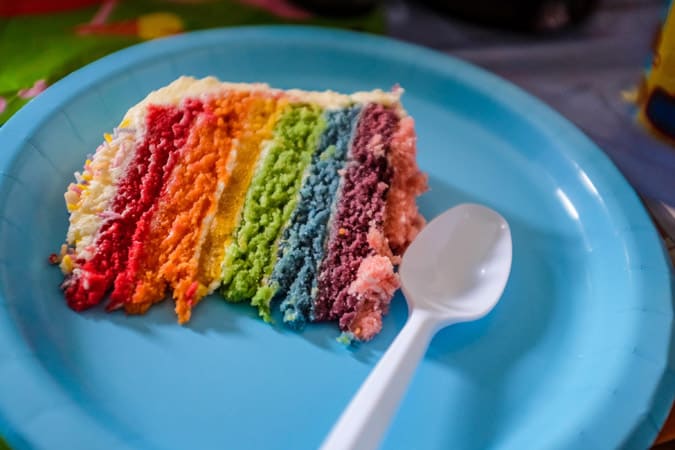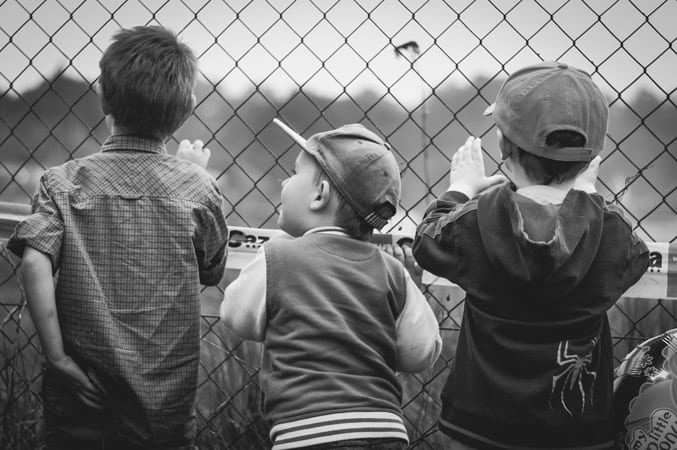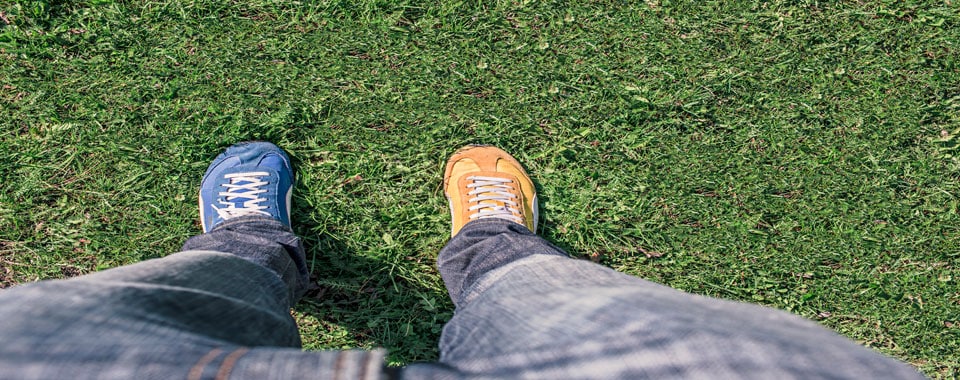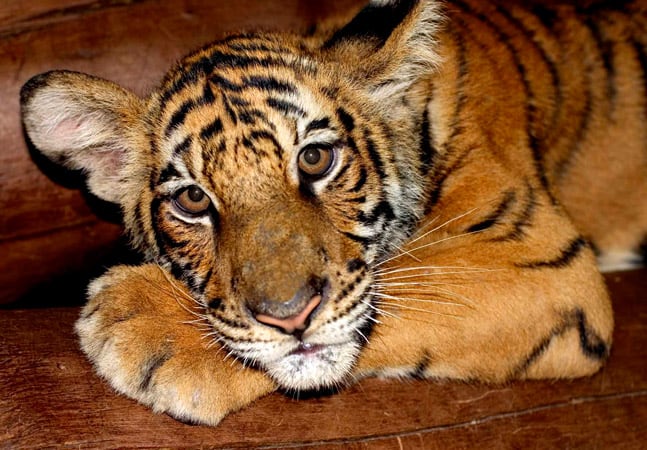Hi there,
What’s the Story?
For most of the last week, I’ve been in bed sick with a head cold and sinus infection, plus every muscle in my body has been aching. No sympathy needed – I expected it given the marathon and how much I put in.
In this week’s article, I go deeper than ever before into my mind about why I did the marathon and why it meant so much to me. I also walk you through the experience of the race itself. It’s a LONG article, so if you manage to get through it, let me know what you think. It’s one of the most enjoyable articles I have ever written.
In other news, I released a fantastic interview with the great Phil M. Jones yesterday. He offers so many amazing nuggets of wisdom on communication, politics, difficult conversations, persuasion, and so much more. Check it out here: video.owenfitzpatrick.com.
__________________
You Could’ve Just Gone to Therapy – Why I Ran the NYC Marathon
Estimated reading time: 15 minutes 40 seconds
“The purpose of life is to be defeated by greater and greater things.”
Rainer Maria Rilke
I’d been waiting for three hours for something to happen. I didn’t know what exactly yet. I knew my body was going to scream at me. I just wasn’t sure what language it was going to speak.
My lower back was the first alarm to sound as it seized up. My heart sank. Here we go. I was 17 miles into the New York Marathon, and the ‘wall’ as it’s known, began to make its presence felt. The science behind the wall suggests that it occurs because of the depletion of glycogen stores in the muscles and liver, which forces the body to rely more on fat as an energy source, which is slower and less efficient. What it felt like was that every single cell of me was falling apart and disconnecting from myself and each other.
But it wasn’t just glycogen depletion. My body was not ready for this volume of work. The last month and a half without a long run did me in. My left hamstring tightened. ‘That’s not good’. Then, my right. Cramps crawled through my body. My legs began to hurt all over.
Everything had been going well up to this point. As I groaned loudly, I began thinking about the journey here since signing up all those months ago.
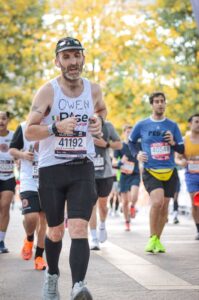
I felt great until I didn’t. And once I started feeling bad, it just got progressively worse.
I couldn’t put my finger on the moment I decided to try and do the New York City Marathon, but once I set my mind to it, I was all in.
I was selected by a charity called Rise Against Hunger as one of seven runners to raise money for their cause. An incredible organization, they help starving families and children worldwide. My pain was nothing compared to what they were going through. If running through New York could help me help them, I was delighted.
Why do we run marathons? Why 26.2 miles? The person to blame is actually a 19th-century linguist known as Michel Bréal. He was obsessed with the famous ancient Greek legend of Pheidippides the messenger and suggested a race should be included in the Olympics in 1896 to honor it. Robert Browning’s poem Pheidippides was a significant influence on Michel:
“Run, Pheidippides, one race more! the meed is thy due!
‘Athens is saved, thank Pan,’ go shout!” He flung down his shield,
Ran like fire once more: and the space ‘twixt the Fennel-field
And Athens was stubble again, a field which a fire runs through,
Till in he broke: “Rejoice, we conquer!” Like wine thro’ clay,
Joy in his blood bursting his heart, he died–the bliss!”
The story goes that after the Battle of Marathon, Pheidippides ran from the battlefield of Marathon to Athens, a distance of approximately 26 miles, to deliver news of the Greeks’ victory over the Persians in 490 BCE. Upon reaching his destination and proclaiming “Victory”, he collapsed and died from exhaustion. DIED!*
MILE 17
On mile 17, I felt like death. I still had nine miles and approximately 90 minutes left of running. It was like every part of my body was getting a root canal treatment.
After a couple more miles, I took out my AirPods and went to a playlist I had created the day before. Gonna Fly Now from the Rocky soundtrack welcomed me into the Bronx. I tuned out the world around me and focused on the music.
Tryin’ hard now, it’s so hard now
Tryin’ hard now
Feelin’ strong now, won’t be long now
Feelin’ strong now
Gonna fly now, flying high now
Gonna fly, fly, fly.
The greatest moment in the movie Rocky is at round 14 when he gets knocked down by Apollo Creed. Rocky’s trainer, Mickey, trying to protect him from more damage, shouts at Rocky: ‘Down, stay down.’ Apollo lifts his hands believing he has won. Then, somehow, Rocky crawls to his feet. To this day, this scene has me in tears.
When I was a kid, the story saved my life. It was a metaphor for me to deal with the unhappiness I lived in. The beauty of Rocky wasn’t that he was a fighter. It was that he was an underdog. We all feel like an underdog so often in life. It’s us against the world. At that moment, the music was like an adrenaline shot that I badly needed.
I had heard it played earlier in the route by a band at the side of the street. Of all the major marathons, New York is regarded as one of the toughest. While the average finishing time for the Dublin Marathon in 2024 was 4 hours 11 minutes, the average finishing time for the New York Marathon was 4 hours 39 minutes. The bridges, the hills, and the sheer energy of the city all demand more.
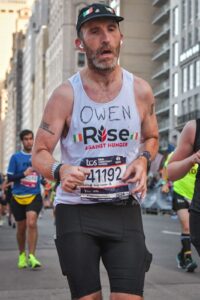
The realization that I was just going to be in pain for the rest of the run.
There are huge groups of people that choose to run marathons. Many go on to run ultra-marathons and even run across continents. Comparatively, marathons are not that big of a deal nowadays. Anyone can finish one with training. But I didn’t just want to finish it. I wanted to know what I was capable of. For me, it wasn’t about the distance. It was about how I was going to run it. The marathon gives you the chance to test your limits. There were going to be thousands of runners faster than me and thousands slower. That was irrelevant. I was chasing a time that would find out everything inside of me. I was looking for the ultimate test.
The Bronx beckoned. Be careful what you wish for.
MILE 21
Five miles to go. I found myself back in Manhattan. I slowed a bit but kept moving. I could do this. The Show Must Go On was next on my playlist.
The show must go on
The show must go on
I’ll face it with a grin
I’m never giving in
On with the show.
My hips stung and my lower back felt a wave of gravity pulling me down. I steadied myself, reminded of the weeks and months leading up to this. How important this was to me. How I promised myself that I would leave nothing left in the tank.
When I did the Dublin Marathon 24 years ago, I was a nimble 22-year-old. I did a time of 3 hours 39 minutes. I was incredibly proud of that time. New York was a different animal. I knew at this age that I was unlikely to break 4 hours. As I set out to train, however, I decided I would shoot for under 4 hours and 15 minutes.
This required running a mile in under 9 minutes 43 seconds consistently for 26.2 of them. That would be really tough for me to do. 46 years carry dozens of reminders of a hectic lifestyle.
Not to mention, training for New York was grueling. I grappled with stomach issues and extensive travel; every piece of training felt like a slog. The long runs at the weekend were a nightmare. I’d dread them all week long. By the end of summer, my body was shattered: ‘This is not a good idea.’ Why was I putting myself through this?
As I looked ahead, an Irish flag waved to my left. I touched the one on my hat, summoning strength from home.
MILE 22
Four miles left. The dreaded Fifth Avenue Hill alongside Central Park. To my left, a lady began to limp and was immediately helped off the course by two volunteers. Spasms continued throughout my body. My elbows. My shoulders. My feet. My calves. My legs felt like lead. Till I Collapse by Eminem sounded through my Air Pods.
(Yo, left, yo, left) ‘Cause sometimes you just feel tired
(Yo, left, right, left) Feel weak, and when you feel weak
(Yo, left, yo, left) You feel like you wanna just give up
(Yo, left, right, left) But you gotta search within you
(Yo, left, yo, left) Try to find that inner strength and just pull that shit out of you
(Yo, left, right, left) And get that motivation to not give up
(Yo, left, yo, left) And not be a quitter
(Yo, left, right, left) No matter how bad you wanna just fall flat on your face and collapse
My body taunted me, reminding me of all the injuries. In the past five years, I broke my arm three times – all while running. Each fall, each fracture in the same spot, left me questioning the wisdom of this goal. Was my body made for this? Every run I went on, I was extra cautious and extra aware. I was always one tumble away from ruling myself out. Still, I ran and, actually, by mid-September, I felt I was in good shape. I began to believe that my time was a real possibility.
At the end of September, things changed. On a six-mile run, my right hamstring seized after only three miles. I limped a long walk home. It was a condition known as sciatica. My lower back was putting pressure on the sciatica nerve, which was shooting pain down my hamstring. I went to the physio twice a week, and they relieved the pressure until the next time I ran.
For the final month, I was forced to curb my training and stop the long runs over 12 miles. I had to slow down and even walk some of the training runs. Basically, take no risks and just keep working on my injury to minimize how it might impact me on race day. My ideal time was slipping away. Now, anything below 4 hours 30 would be a win.
The week leading up to the marathon was its own rollercoaster. I felt exhausted, and my stomach felt sick and bloated every day. I wasn’t fit enough to run the full distance. How would I cope? Then, it was race day.
Now, I was in over my head.
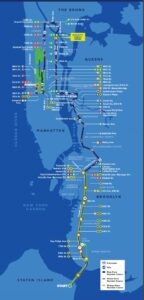
The toughest parts of this course were the two biggest bridges and the hill up 5th Avenue around mile 22/23.
MILE 23
Three miles. It was just too much. I slowed to a halt. Even walking felt impossible. My inner voice begged me to quit: ‘Just stop. You’ve done enough.’ But I wasn’t here to just finish. I pressed on. Running. Walking. Running. Every step screaming. The doubts crept in. ‘I knew you weren’t fit enough for this. How could you be, with the injury?’
My attention went to anyone who passed me. All of those people who are so much fitter, faster, or better. ‘What’s the point in hurting yourself?’ I could feel the blisters on my toes scraping against the shoe.
The soundtrack of Braveheart captured my imagination, and I found myself lying in bed and watching the movie again. The beautiful melodies transported me to Scotland a thousand years ago. I smiled until I realized that I wasn’t in bed. I was stumbling up a hill in Manhattan.
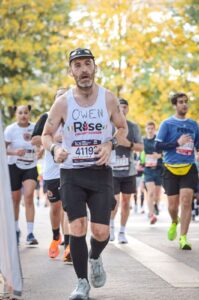
My favorite photo of the race wasn’t me crossing the finishing line with a smile. It was here where I looked absolutely spent. In pain. Suffering. Because that’s what made the experience so meaningful.
Earlier, I had begun well. I was comfortable and felt quite elated that I had even made it to the starting line, given all that had happened. I started at quite a pace but tried to keep sensible. I wanted to speed up but stopped myself multiple times. Brooklyn was so much fun. Having written my name on my shirt, thousands of strangers cheered me on. ‘Owen, you’ve got this!’ they shouted, making me feel like a celebrity for a day. It was wonderful.
In a week where I saw so much hate across America, there was nothing but love on the streets of New York.
There were those who had been there every step of the way. The many conversations in the months leading up to it. Those who donated. And my loved ones and friends. Some of them were scattered along the route. Some of them had signs. Some had Gatorade. All had hugs. And all gave me an extra boost upon seeing them. It’s the people you love who give you most of your strength after all.
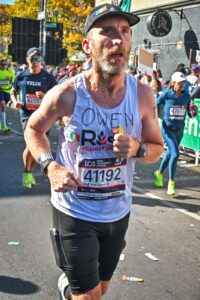
Putting my name on my shirt was the best idea ever.
At the halfway mark, I came to the first bridge since our trip to Brooklyn at the start. The Pulaski Bridge is close to my home so I ran over it on almost every training run. When many around me were struggling, I was comfortable and eased past them. I was in familiar territory.
Then, the really tough bridge, the Queensborough Bridge from Queens to Manhattan, was the next big challenge at mile 16. Again, I’d been over and back on this bridge plenty of times. I wasn’t fazed. I was tired, but I patiently climbed and found myself comfortable.
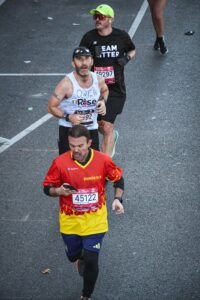
I remember seeing the camera and thinking to myself, ‘I’ve got this’.
Just a few miles later, I was in hell.
MILE 24
Two miles left. We entered Central Park. Rolling hills greeted us as I continued the rhythm. Halfway up one of the hills, I fell into a walk. Gritting my teeth, I pushed into a run again. I wobbled, feeling like I could collapse at any second. My mind was playing tricks on me. I found myself swaying from one side of the road to the other. I let out an audible moan.
One of the runners next to me caught my eye for a moment. A simple nod. Sharp stomach cramps added to my misery. “STOP THIS NOW” my body pleaded. Only two and a bit miles to go, but it may as well have been another twenty miles.
So many nights, I would lie awake wondering if I was going to get to the starting line. Now, so many miles in, I was begging for the pain to end. But I just couldn’t let myself. Champagne Supernova by Oasis drowned out my inner dialogue.
Someday, you will find me caught beneath the landslide
In a champagne supernova in the sky
Someday you will find me caught beneath the landslide
In a champagne supernova, a champagne supernova in the sky.
When I was younger, I struggled a lot with my mental health. I spent a lot of time alone and depressed. Sport allowed me to show what I was made of. I’m not naturally gifted at sports. I never had the physique, and as you might have guessed from all the arm breaks, I’m kinda clumsy. But not being as good taught me to rely on my heart.
When I played tennis, for instance, I had this reputation. You might be significantly better than me or have a better racket, but to beat me, you’d have to scrape me off the court. While I was losing in life, sport gave me moments where I could fight back and win. Sport helped me love myself. It was never about winning. It was about showing up and trying harder than ever.
We don’t often have the chance to give something our all. For us to do so, something has to challenge us enough. Far too often, we find ways to make things easier rather than harder. We buy technology that saves us time and energy. We don’t need to run across Greece to tell people of our victory. We just text. But that is robbing us of the opportunity to explore our character.
You don’t have to run a marathon to explore your character. But I believe you do have to challenge yourself. Character is revealed through how we handle adversity.
My mind drifted to a movie I had seen recently Unbroken. It’s about a runner who found himself tortured as a prisoner of war in World War Two. His brother gave him a piece of advice that helped him get through it. ‘If you can take it. You can make it.’ I repeated those words over and over.**
MILE 26
My back seized even tighter, and my legs felt like they’d detached from my body, unresponsive, unwilling. Each step felt like breaking through concrete, and every joint screamed in protest. I kept pushing. Running. Walking. Running.
The music pounded in my ears as I gasped for air, my eyes blurred. I closed them and opened them again, wishing it was over. I glanced around me and saw thousands of spectators willing us to continue. One of them pointed in front of me. There it was. The finish line. Two hundred yards away.
I reached inside of myself and gave it one more push, my legs ready to collapse.
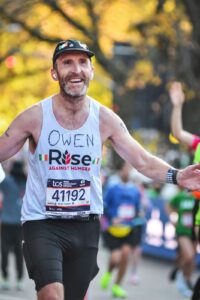
I can’t do justice to what this felt like.
Relief poured across my face as I crossed the line. My entire lower half went stiff as a board, and I almost toppled over as I felt as if I’d just been dropped into a bucket of freezing water. The hair stood on the back of my neck. All of that effort. All of that work. All of that pain. The months and weeks I put in.
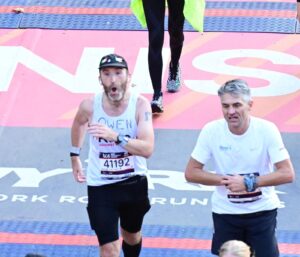
The exact moment that my legs went stiff at the finishing line, and I almost fell over.
When Rocky fought Apollo Creed, both exhausted fighters fell into each other’s arms at the end of the fight. Apollo says to Rocky, ‘Ain’t gonna be no rematch’. Rocky responds, ‘Don’t want one’.
‘Ain’t gonna be no rematch’. I thought as I continued the slowest walk of my life as my body dealt with the shock.
The Meaning of a Marathon
The New York Marathon I ran in turned out to be the biggest marathon in recorded history, with 55,646 runners. That morning, I arrived early at the starting village in Staten Island. The route moves through all five boroughs. We started by running across the Verazanno Bridge into Brooklyn. Then, up the length of Brooklyn across into Queens. Then, Manhattan up First Avenue to the Bronx and back from the Bronx down to a tough finish at Central Park.
Five days later, I’m still in pain—head cold, sinus infection, bruised toes, sore back, stiff legs. But there’s no self-pity. Every ache reminds me that I gave everything. I chose this pain. It is a representation of how much I put into this.
Along the route, one of the funniest signs I saw someone in the crowd holding up was: ‘You could have just gone to therapy.’ I remember staring at that for an extra second and contemplating why we feel the need to put ourselves through difficulties like this.
For some, running the marathon is proof of vitality. A way to remind ourselves and the world that we are very much alive. Others love running. And some love being the kind of person who does marathons. For me, it was something else.
Life is a series of challenges that we must overcome. But sometimes, we try to take the easy way out. We avoid the challenges that might help us grow. We then find ourselves hit hard by the challenges that aren’t our choice. To me, our capacity for growth is related to our ability to constantly seek greater and greater challenges with each opportunity we get.
In a world of shortcuts, the hardest path reveals our limits – and our strength. This race wasn’t about the time or the medal. It was about finding out what I’m made of. I searched for my limit, and I found it. That search gave this experience its meaning. It was never about running 26.2 miles. It was about proving, in the face of uncertainty and pain, that I could.
As I began the long, agonizing walk out of the park, the official results came through:
4 hours, 7 minutes, 45 seconds.
Wow.
There’s a joke:
“How do you know if someone has run a marathon? They’ll tell you.”
And it’s true. This race consumed me for months. Every thought, every conversation, circled back to it. Even now, I want to relive each painful, exhilarating mile.
But running a marathon isn’t about impressing anyone else. It’s about proving something to yourself. In a world filled with doubt, both from others and from within, this race reminded me of one undeniable truth:
I can. I can. I can.
I shuffled forward, surrounded by a sea of other exhausted warriors, each carrying their own scars. I felt the urge to cry but couldn’t. My body, drained and broken, had nothing left. Someone slipped a medal around my neck – a surprisingly heavy token of the toughest thing I’ve ever done.
In that moment, I silently whispered to myself:
“Yo, Adrian… I did it.”
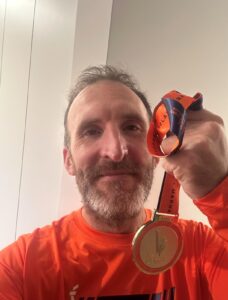
*Some suggest that he actually ran from Marathon to Sparta, which is much further.
**I am not comparing running a marathon to being tortured in a POW camp.
____________________
The Brain Prompt
How can you challenge yourself?
How can you find out what your limits are?
Find opportunities to become greater and greater.
Find out what’s possible.
Subscribe to the Inner Propaganda newsletter for weekly insights on language, influence, and the art of persuasion: owenfitzpatrick.com/newsletter.
Cheers,
Owen.

